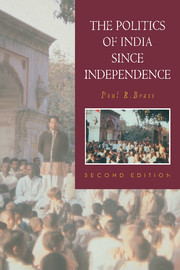Book contents
- Frontmatter
- Dedication
- CONTENTS
- List of figures and tables
- Preface
- List of abbreviations
- 1 Introduction: continuities and discontinuities between pre- and post-Independence India
- PART I POLITICAL CHANGE
- Introduction
- 2 Political change, political structure, and the functioning of government
- 3 Parties and politics
- 4 State and local politics
- PART II PLURALISM AND NATIONAL INTEGRATION
- PART III POLITICAL ECONOMY
- Bibliography
- Index
4 - State and local politics
Published online by Cambridge University Press: 05 February 2015
- Frontmatter
- Dedication
- CONTENTS
- List of figures and tables
- Preface
- List of abbreviations
- 1 Introduction: continuities and discontinuities between pre- and post-Independence India
- PART I POLITICAL CHANGE
- Introduction
- 2 Political change, political structure, and the functioning of government
- 3 Parties and politics
- 4 State and local politics
- PART II PLURALISM AND NATIONAL INTEGRATION
- PART III POLITICAL ECONOMY
- Bibliography
- Index
Summary
Parallel trends and counter-tendencies have been at work especially in the post-Nehru period both in center-state relations and in the relations between state governments and district institutions. With regard to center-state relations, the offices and institutions of state government have increasingly been turned into instruments for implementing the will of the central government leadership. The counter-tendencies, partly arising out of India's regional/cultural heterogeneity but also in response to the imposition of Delhi's direct and indirect rule over the states, have been the regionalization of state politics and party systems, the increasing assertion of demands for revision of center-state relations, for regional autonomy, and even for outright secession.
Insofar as district and local politics are concerned, similar processes have been at work. On the one hand, ruling parties in the state governments, particularly the Congress, have allowed district and local institutions of self-government to decline or have limited their powers or have even frequently superseded them altogether in order to maintain tighter control over local systems of patronage and to establish stable bases of local support. The counter-tendency has been the persistence, even the reassertion, of structures of local power which exist independently of government and party organizations and the revival of interest, especially among the non-Congress parties, in the restoration of local institutions of self-government.
STATE POLITICS
Roles of the state governor
The constitutional role provided for the state governors and the practices which have evolved in relation to the office of governor since Independence have provided the focal point of contestation over the relative balance between autonomy and central control in center-state relations. The national leadership in the Constituent Assembly was concerned to maintain the strength of the Center in relation to the states and to have the recourse to intervene in cases of serious instability and political and communal unrest. At the same time, they wished to establish full parliamentary government at the state as well as the central levels, in which a governor with executive power would be inconsistent. The Constitution partly reflects this ambiguity in its specification of the appointment and powers of the state governors.
- Type
- Chapter
- Information
- The Politics of India since Independence , pp. 116 - 148Publisher: Cambridge University PressPrint publication year: 1994

